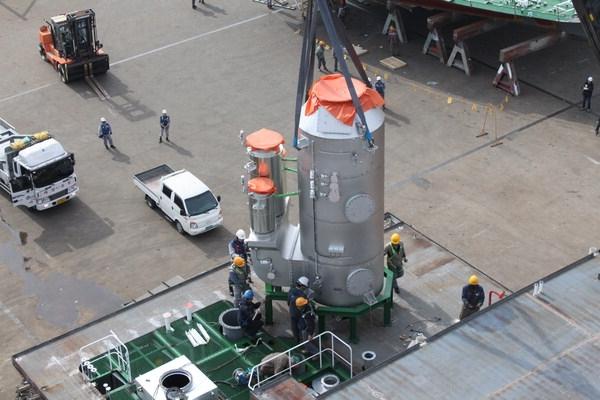
- This is PANASIA
- ESG Management
- History
- Smart PANASIA
- Contact information
 About
About
Check PANASIA introduction,
ESG management, and History
information
- Energy Solutions
- Air Solutions
- Water Solutions
 Eco-friendly Solution
Eco-friendly Solution
About Global environmental
regulation, Hydrogen business,
Air quality, and Water quality
environment solutions
- Product Service
- Service Network
- Customer Service
 Customer Support
Customer Support
Check the Panasia’s
after service
- About
- Eco-friendly Solution
- Customer Support
- Media
NEWS
Environmental regulations?
No more worries: PANASIA ships first scrubber in Korea

The first-ever scrubber in Korea has been shipped.
PANASIA, a marine equipment supplier based in Busan, Korea, became the first company in the country to ship a scrubber developed using its own proprietary technology. A scrubber is a technology aimed at meeting the regulations for sulfur oxides that the International Maritime Organization (IMO) began to implement in 2020. The scrubber uses water to clean and remove sulfur oxides present in ship exhaust gases.
PANASIA announced on the 1st, “On the 12th last month, our de-SOx system for ships (PaSOx™ smart v2.0 Scrubber) we developed using our proprietary technology was shipped to Woomin Shipping and has been deployed to ships being built in the Samkang M&T shipyard.” This marks the first example of deploying a locally developed scrubber to actual ships.
Spent 5 years developing de-SOx systems
Internationally recognized technology, including in the U.S.
Shipped to Woomin Shipping, and deployed to ships
Tightening regulations for sulfur oxides in 2020
Demand from shipowners expected to grow Scrubbing technology has gained increased interest as the IMO has recently imposed a stricter sulfur limit of 0.5%, lowered from the current limit of 3.5%. Now, shipowners should install scrubbers on their ships by 2020 to comply with the new environmental regulation for SOx. They should either reduce sulfur levels, or replace existing fuels with low-sulfur oils or LNG.
In preparing for the tightening of environmental regulations, PANASIA began R&D on scrubbers in 2012 and successfully developed its own products. Since two years ago the company has had those products validated. In particular, PANASIA has received American Bureau of Shipping (ABS) Type Approval for its various products. Consequently, its technology has gained international recognition.
But the problem was that it did not lead to an actual result. Shipowners, both domestic and international, were still using European products, not PANASIA’s, even though PANASIA was one of the pioneers in scrubbing technology in Korea. This is because PANASIA had not delivered an actual result.
Eventually, though, PANASIA became the first Korean company to ship its own scrubber with a more aggressive effort, such as by verifying the outstanding desulfurization performance of the scrubber deployed at its headquarters. Also, PANASIA’s scrubber incorporates internet of things (IoT) technology to enable satellite monitoring 24/7, which gives it a competitive edge over other scrubbers.
Lee Soo-gyu, principal investigator (PI) and R&D General Manager at PANASIA, said, “Once our scrubber proves its performance on board actual ships, we expect to see growth in demand from more shipowners, who are still considering installing scrubbers.”
According to sources such as the U.K.-based ship research group, Clarksons, there were about 240 vessels with scrubbers on board as of December last year. Most of the ships belong to shipowners that operate in areas where more stringent emissions regulations apply, such as the Baltic Sea, the North Sea, the North American area, Puerto Rico, and the Caribbean Sea. However, as the IMO continuously tightens its environmental regulations, demand for scrubbers continues to grow. In the two years from 2015 to 2017, the percentage of new vessels with de-SOx systems on board increased from 1% to 5%.










